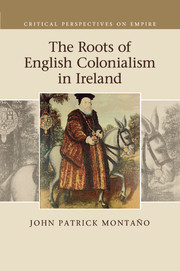7 - Bad manners, nasty habits
the elimination of Irish customs
Published online by Cambridge University Press: 05 February 2012
Summary
When in 1534, Silken Thomas repeatedly abused Henry VIII and ominously rejected his authority in Ireland, he also claimed to be a Catholic crusader and imposed oaths of loyalty to his cause, the pope, and the emperor upon all those who joined him. These actions distinguished his rebellion from more conventional ones like the Pilgrimage of Grace that always situated themselves as conventional protests against particular grievances and councilors and insisted on their unwavering devotion to the monarch. Consequently, the confiscation of Kildare land and the dissolution of the monasteries provided an early opportunity for new men to consider a new policy that involved the introduction of civil inhabitants and the elimination of barbarous customs. Therefore, after months of irresolution Henry sent Skeffington – the Gunner – to suppress the uprising, thereby abandoning Wolsey’s policy of relying on “sober ways and persuasions … and not by violence” that Cromwell had continued. The appointment of a military man like Skeffington as lord deputy, followed by the marshal of the army Lord Leonard Grey, was an indication that Cromwell was now willing to turn to the coercive measures advocated by his new adherents in Ireland.
- Type
- Chapter
- Information
- The Roots of English Colonialism in Ireland , pp. 335 - 385Publisher: Cambridge University PressPrint publication year: 2011
- 1
- Cited by

